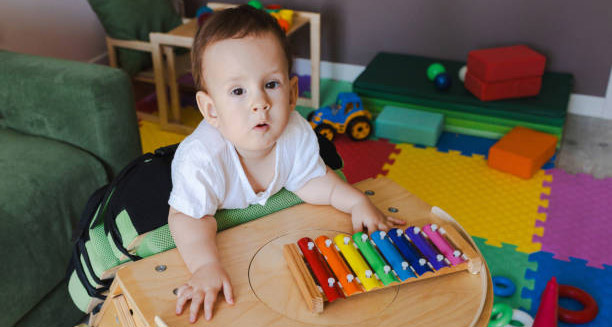Complications of Krabbe disease often arise as the condition progresses, profoundly impacting both the individual’s quality of life and the overall course of the illness. Because Krabbe disease is a rare, inherited neurodegenerative disorder, it causes damage to the protective myelin sheath surrounding nerve cells in the brain and throughout the nervous system. As a result, the complications of Krabbe disease affect a wide range of bodily functions, often leading to severe physical, neurological, and developmental consequences.
One of the earliest and most distressing complications is developmental regression. Infants who initially meet early milestones—such as smiling, holding up their heads, or cooing—may begin to lose these abilities as the disease advances. This loss usually cannot be reversed and may happen quickly. For parents, watching their child lose skills is very painful. Therefore, emotional support and counselling are vital alongside medical care.
Muscle Weakness and Feeding Issues
Severe muscle weakness and stiff muscles (spasticity) are common problems. As the disease harms motor nerves, patients lose control of their muscles. This leads to tight muscles, stiffness, and painful spasms. Many affected individuals eventually become unable to move and need wheelchairs or full-time care, especially in infantile cases.
Feeding and swallowing difficulties also occur often. These problems can cause poor nutrition, dehydration, and a serious lung infection called aspiration pneumonia. Many children with Krabbe disease need feeding tubes to get enough food safely. This method can increase the risk of infections and requires careful care.
Breathing Problems and Seizures
Respiratory problems are among the most dangerous complications of Krabbe disease. Weak breathing muscles make it hard for patients to breathe well. They are more likely to get chest infections. Pneumonia often causes hospital stays and is a leading cause of death. Poor muscle control also reduces the body’s ability to clear mucus, raising the risk of blocked airways.
Seizures happen frequently as the disease worsens. These seizures range from short staring spells to full convulsions and can occur many times a day. Some patients develop epilepsy that does not respond well to medication. Managing seizures in Krabbe disease takes careful balancing of medicines and close monitoring.
Sensory Loss and Cognitive Decline
The complications of Krabbe disease also include loss of senses. Many children lose their vision and hearing early on. This loss causes isolation and makes communication very hard, especially for those who cannot speak yet. Hearing loss can become complete, and vision may fade to total blindness. This makes assistive devices and special therapies necessary.
Cognitive decline is another major concern. Early treatment with stem cell transplant may protect some brain function in patients without symptoms yet. However, most children suffer worsening mental ability. As the brain’s white matter breaks down, memory, attention, learning, and language skills fade. Older patients may show signs like confusion, personality changes, and memory loss that resemble dementia.
Orthopaedic and Incontinence Issues
Children with advanced disease often face bone and muscle problems because of long immobility and uneven muscle strength. These include joint stiffness (contractures), curved spine (scoliosis), hip dislocation, and weak bones. While physiotherapy and braces can help, the disease usually causes worsening problems despite treatment.
Incontinence is common as patients lose bladder and bowel control. They may need diapers or catheters. This loss of independence affects hygiene and skin health. It also adds emotional stress to both patients and caregivers. Ensuring comfort and dignity is an important goal in long-term care.
Communication Loss and Life Expectancy
In later stages, many patients cannot speak, gesture, or respond to others. This situation is very hard for families emotionally. Early in the disease, alternative communication tools—like eye-tracking devices or picture boards—may help. However, these aids often lose effectiveness as the disease advances.
One of the most tragic complications of Krabbe disease is shortened life expectancy. Infantile Krabbe disease usually leads to death by age two or three, though some live longer with intensive care. Juvenile and adult forms progress more slowly but still shorten life and cause severe disability. For these patients, problems build up over time, reducing quality of life and independence.
Emotional and Financial Burden
Besides medical issues, complications of Krabbe disease cause heavy emotional and financial stress. Caregivers often stop working to provide full-time care, which lowers household income and strains relationships. Medical equipment, medicines, therapies, and travel to specialist centres can be very expensive. Many caregivers face exhaustion, anxiety, depression, and burnout. Support groups and mental health services are essential.
Palliative care becomes vital as the disease advances. It aims to relieve suffering, keep the patient comfortable, and support families through the emotional challenges. Palliative teams help manage pain, breathing troubles, and distressing symptoms. They also guide end-of-life decisions and provide grief counselling.
Early diagnosis and treatment, especially with stem cell transplants, can delay or reduce some complications. This makes newborn screening programs very important. Detecting Krabbe disease before symptoms appear gives the best chance to improve outcomes and lessen long-term problems.
In conclusion, the complications of Krabbe disease affect nearly every body system and cause severe physical and emotional hardship. From muscle weakness and seizures to breathing failure and mental decline, the disease creates ongoing challenges. Yet, with early care, teamwork among specialists, and supportive therapies, some patients may enjoy better quality of life and longer survival. Families need compassionate care, clear information, and emotional support as they face this difficult journey.


